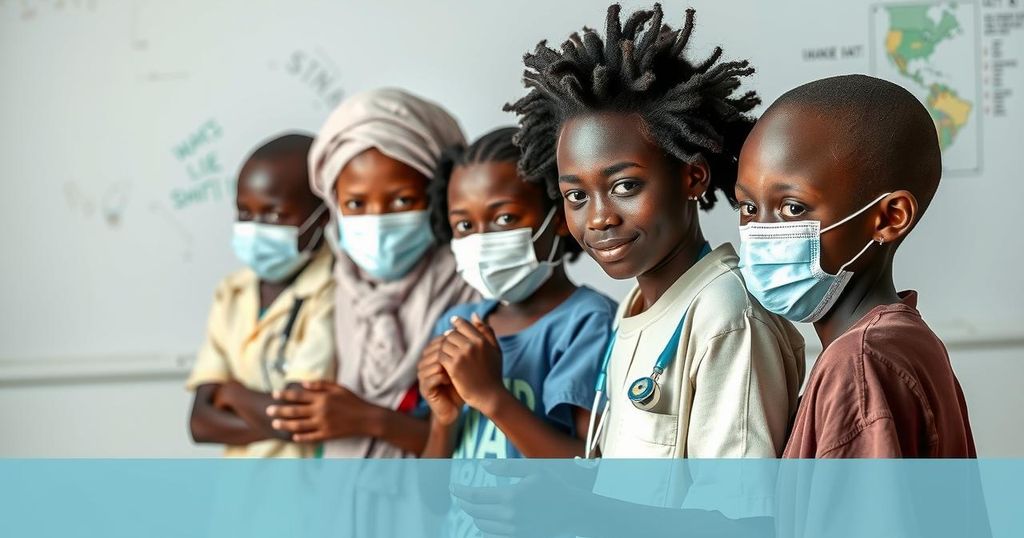World news
AFRICA, ANTÓNIO GUTERRES, DISPLACEMENT, EUROPE, FILIPPO GRANDI, HAITI, HUMANITARIAN AID, HUMANITARIAN CRISIS, INTERNATIONAL AID, NORTH AMERICA, OCHA, OFFICE FOR EMERGENCY RELIEF COORDINATION, STÉPHANE DUJARRIC, SUDAN, TOM FLETCHER, UKRAINE, UNHCR, UNITED NATIONS, WAR, ZAPORIZHZHYA
Lena Nguyen
0 Comments
Global Humanitarian Efforts: Support for Ukraine, Haiti, and Sudan
The UN is actively helping several humanitarian crises, including Ukraine, Haiti, and Sudan. Tom Fletcher visited Ukraine, emphasizing solidarity amidst Russian assaults, while UN Secretary-General António Guterres commemorated victims of the 2010 Haiti earthquake. The World Bank and health organizations announced an $82 million initiative for Sudan’s healthcare system, addressing significant vulnerabilities within the population.
The United Nations has been active in several critical humanitarian crises worldwide. Recently, the UN’s top aid official, Tom Fletcher, visited Ukraine, expressing solidarity with its citizens enduring recurrent assaults from Russian forces. In Zaporizhzhya, he highlighted ongoing air strikes leading to civilian casualties and extensive destruction. Ukrainian communities were praised for their resilience, particularly in providing shelter and education, as schools are constructed underground to safeguard children.
Fletcher also is scheduled to visit Kharkiv to launch humanitarian responses for Ukraine, reflecting the UN’s commitment to assist over eight million individuals impacted by the conflict. Emphasizing this initiative, he stressed that international support is equally vital.
On another humanitarian front, UN Secretary-General António Guterres commemorated the victims of the devastating earthquake in Haiti from January 12, 2010, which adversely affected approximately three million people and continues to influence the nation profoundly. During a ceremony in Port-au-Prince, Guterres remembered the victims and reaffirmed the UN’s ongoing dedication to support the Haitian government and its populace.
In a separate initiative, the World Bank and various health organizations signed an $82 million agreement to bolster Sudan’s stricken healthcare system, where over 70% of health facilities have become non-operational due to conflict. This agreement, termed SHARE, aims to provide vital medical supplies and services for more than eight million individuals in need, addressing severe vulnerabilities among children and families.
Health services in Sudan have faced severe setbacks due to the ongoing conflict, yet the SHARE initiative seeks to restore essential services and enhance the overall health system.
These efforts underscore the international community’s commitment to support nations in crisis as they navigate challenging humanitarian landscapes.
Recent developments in global humanitarian efforts highlight ongoing support provided by the UN and associated organizations in conflict-affected regions. The significant attention toward Ukraine stems from its ongoing conflict with Russia, which has caused widespread suffering and destruction. Similarly, Haiti continues to cope with the aftermath of a catastrophic earthquake, prompting commemoration and support for its recovery. In Sudan, the healthcare system has been devastated by conflict, requiring urgent international assistance to restore critical services for vulnerable populations, particularly children. Each of these situations necessitates a robust and cooperative international response to ensure affected communities receive essential support and resources.
The United Nations and its partners have demonstrated a strong commitment to address extensive humanitarian needs across Ukraine, Haiti, and Sudan. Through significant initiatives, including emergency financial support and commemorative acknowledgments, these actions emphasize the importance of solidarity, resilience, and preparedness in combating the repercussions of conflict and disasters. The initiatives underscore a concerted effort to rebuild, restore, and support communities navigating through adversity.
Original Source: news.un.org




Post Comment